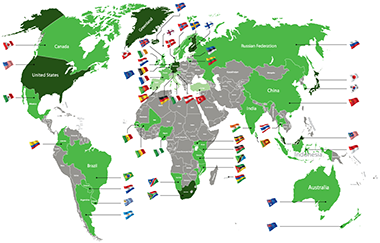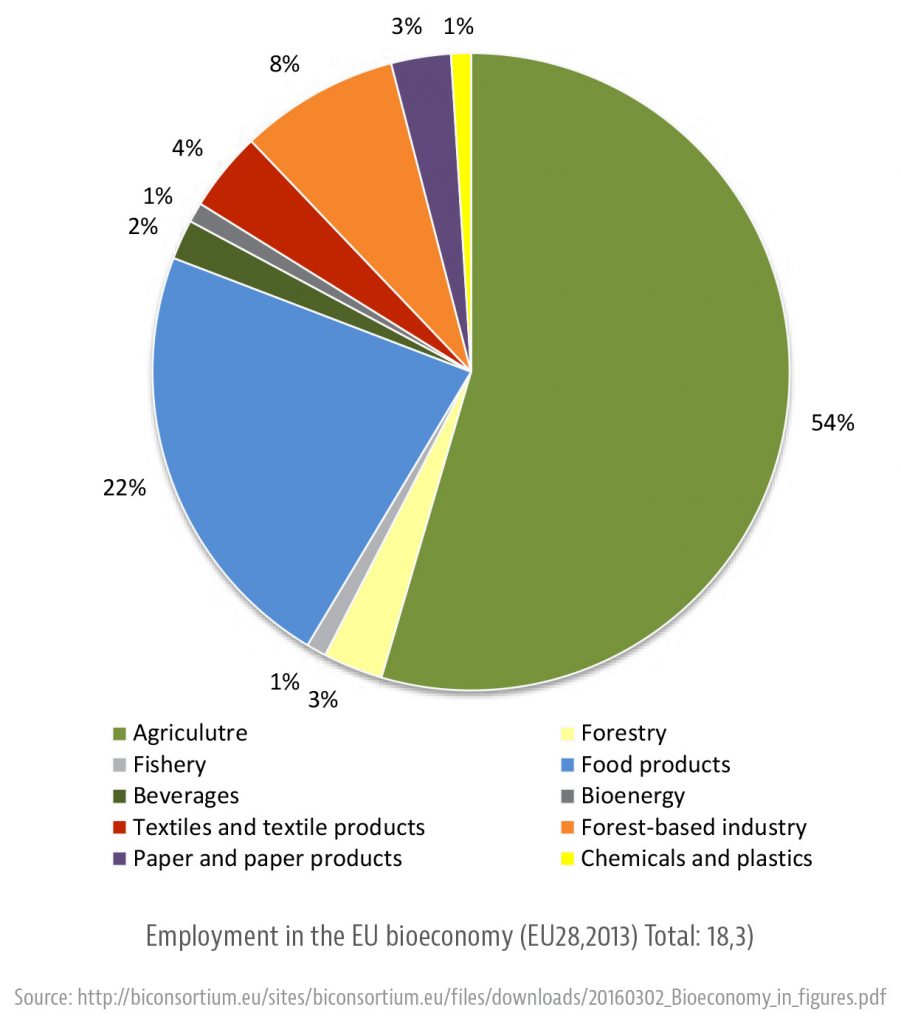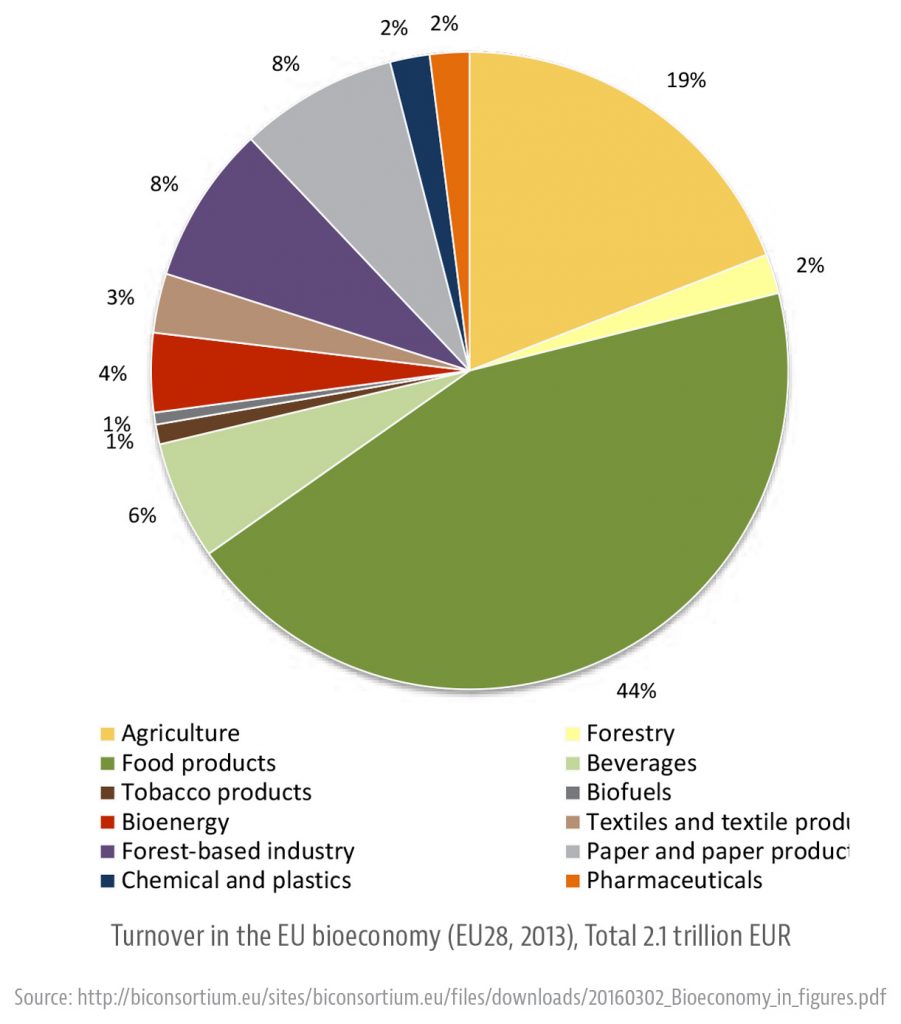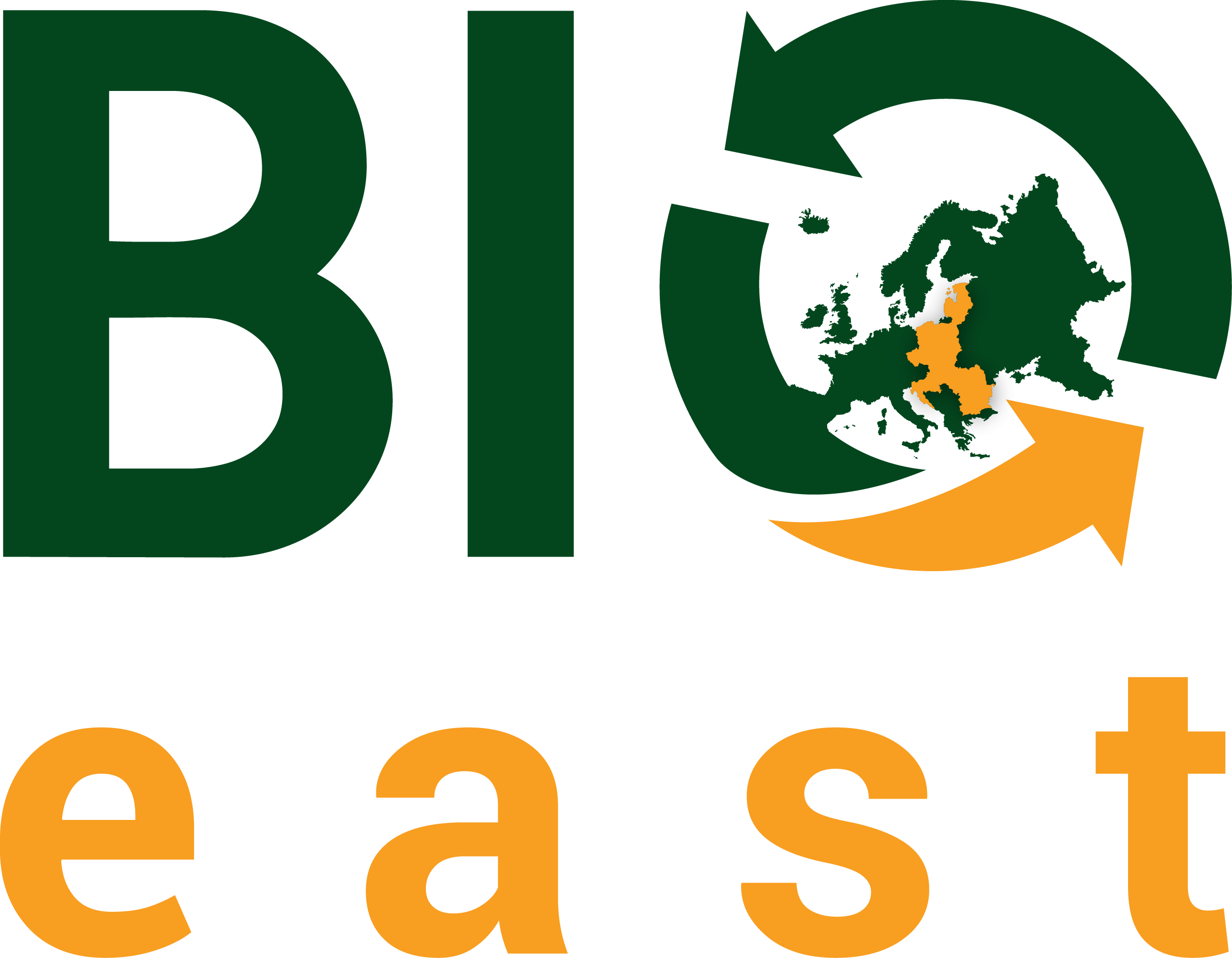BIOECONOMY LINKS
Global bioeconomy agenda

Globally, the bioeconomy has significantly gained in importance in recent years as a broad range of potential benefits has been detected by several countries. Amongst others, the EU and the OECD have emphasized the need for increased international cooperation to further facilitate the development of bioeconomic activities.
The bioeconomy requires new scientific knowledge, innovation and changing technologies to establish and develop biobased processes and to transfer natural resources into sustainable goods and services. Due to this fact, the bioeconomy and the traditional primary production in agriculture, forestry and fishery cannot be treated on an equal footing. The bioeconomy, encompassing both processing and services industries, is related also to the production of biological pharmaceuticals, bioplastics, composite materials, biofuels, biobased chemicals, cosmetics, high value foods coupled with the application of biological knowledge like bioinformatics or environmental engineering.
Global drivers, conducive to bioeconomy transitions are environmental pressure (e.g. climate change, biodiversity loss, land scarcity, safer water supply) and higher and volatile prices of fossil fuels, and growing population and life expectancy. Simultaneously with the drivers there are also constraints such as emerging environmental sustainability criteria, expansion of biobased feedstock use and ensuring global food security to be tackled.
Scope of Bioeconomy in the EU
According to a definition provided by the European Commission, the bioeconomy encompasses the production of renewable biological resources and their conversion into food, feed, bio-based products and bioenergy independently of the processing technologies. It thus includes agriculture, forestry, fisheries, food and pulp and paper production, as well as parts of chemical, bio-technological and energy industries.
In 2012 a bioeconomy strategy was established at EU level with the aim of improving investments in research and innovation reinforcing policy interaction and stakeholder engagement, and enhancing the market and competitiveness in the bioeconomy sectors, however, due to the diversity of the different Member States the individual strategies adopted by them are far from identical but at the same time all of them set the goal to reach coherence in bioeconomy related policies


According to the authors of the European Bioeconomy in Figures the European bioeconomy generated an estimated turnover of app. €2.1 trillion and employed 18.3 million people in 2013. Almost half of the turnover and more than the half of the employed people came from the food and beverage sectors. More than 50% of the turnover was generated by agriculture, forestry and the bio-based industries. In terms of employment the strongest performing bio-based industries were the forest-based industry, paper and paper products and the textile industry.
In creating value by using resources more efficiently Europe can greatly benefit in areas such as the diversification and increase in farmers’ incomes, building new value chains, meeting 25% of Europe’s transport energy needs with advanced biofuels, the creation of a competitive bio-based infrastructure, the replacement of oil-based chemicals and materials with bio-based and biodegradable ones to a greater extent than experienced today. Furthermore in the near future, biorefineries are expected to facilitate the conversion of biomass into higher-value every day products.
R&D in Bioeconomy
- The latest data and information about bioeconomy, including statistics on investments in research, policy mapping, bioeconomy country profiles, data visualization and analytical reports are available for download: https://ec.europa.eu/knowledge4policy/bioeconomy_en
- European Commission – Research & Innovation
Standing Committee on Agricultural Research (SCAR)
The SCAR has grown to become a respected source of advice on European agricultural and wider bioeconomy research, along with being a major catalyst for the coordination of national research programmes, where it has helped shape the beginnings of an integrated European Research Area.
SWG AGRI Development (ARCH)
SWG AKISSWG FOOD Systems
SWG Forestry
SWG BIOECONOMYSWG Fish
CWG Animal Welfare
CWG Sustainable Animal Production
International Bioeconomy Forum (IBF)
The IBF is a flexible multilateral instrument that was established by the European Commission on November 29, 2017 in Brussels during the 1st Plenary meeting. The aim of IBF is to provide a flexible multilateral instrument for international cooperation, (1) specific to the bioeconomy, (2) capable of adapting to emerging global needs and, therefore, (3) to contribute to the achievement of global objectives. The members of the IBF are European Commission, Canada, New Zealand, United States of America, Argentina, China, India, South Africa, the Observers: Australia, South Korea, FAO, SCAR (will become full meber).The BIOEAST Initiative has Observer status in the IBF. The projects will help to develop expertize and to identify experts who can take part in the work of the different working groups as observers and Sherpa. For the BIOEAST region will be an opportunity to take part in the work as observer.
MicrobiomePlant HealthForestryInformation and Communications Technologies in Precision Food SystemsBioeconomy Indicators
https://ec.europa.eu/research/bioeconomy/index.cfm?pg=policy&lib=ibf
http://www.agr.gc.ca/eng/news/events/international-bioeconomy-forum/?id=1537380734873
Bioeconomy Stakeholders Panel
Set by the EU’s Bioeconomy Strategy, the Panel aims to support interactions between different policy areas, sectors and stakeholders in the bioeconomy – leading to tangible actions. The members of the European Bioeconomy Stakeholders Panel have prepared a societal agenda for bioeconomy in a Manifesto published in November 2017. The Manifesto recognizes the opportunities and challenges of developing the Bioeconomy and provides inspiration to stakeholders, regions and Member States, at various stages of development of their bioeconomy strategies, as well as to the EU as a whole.The Panel is a catalyst of the stakeholders views. It was working on the Manifesto prepared by the Dutch Presidency. This bioeconomy model includes the ‘sustainable regions’ notion introduced by the Bioeconomy Panel. The concept will be disseminated via the Eastern European members of the Panelby inviting them into the project expert groups (Foresight and Thematic Groups).
https://ec.europa.eu/research/bioeconomy/index.cfm?pg=policy&lib=panel
European Network for Rural Development
The European Network for Rural Development (ENRD) is the structure that brings together all the stakeholders aiming to achieve improved rural development results in the EU. The network serves as a hub for the sharing of information about how Rural Development policy, programmes, projects and other initiatives are working in practice and how they can be improved to achieve more.A Thematic Group (TG) is working from September 2018 to July 2019, open for all stakeholders and public interested in bioeconomy. The overall objective is to encourage the development of sustainable bioeconomy value chains in rural areas.
Bioeconomy
https://enrd.ec.europa.eu/enrd-thematic-work/greening-rural-economy/bioeconomy_en
